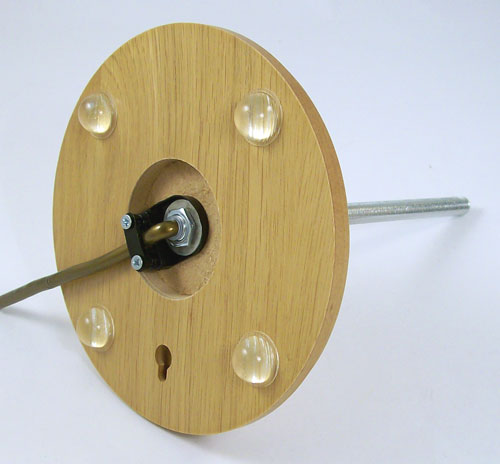First choose how you are going to fix the lampholder to the wood.
Just click on the Blue links and add the part you need to the cart. You can check the cart contents by clicking on the Black round cart buttom top right.
![]()
You can use various fixings but the most common is a backplate which is a 25mm Brass plate with a 10mm thread and can be fixed with 3 small screws. You can have a decrotive cover over this plate as well which can be Brass or Chrome.
Click here for the 10mm backplate Click here for backplate cover
![]()
You can also use a wood nipple which is screwed into the wood and this will allow the lampholder to sit flush with the wooden top.
Click here for the 10mm wood nipple
![]()
Using an Allthread is also a good method. With this you drill a 10mm hole into the wood a glue the Allthread in place allowing approx. 6mm ot thread for the lampholder. This method is ideal if you want ot add some height to the lampholder with a spacer. Try to get as much in the wood as posible for stability. Some popular sizes are listed below.
75mm Allthread 100mm Allthread 200mm Allthread 300mm Allthread
With all the above you will need to have a hole for the flex all the way through the wooden lamp base.
If you need to raise the lampholder from the wood use the backplate or wood nipple with a male / female spacer like these.
Brass 38mm Brass 75mm Brass 100mm Brass 150mm Chrome 38mm
Now we need to think about the flex you want. You will need a 3 core flex if you are using a metal lampholder or you want to earth the lamp base. Normally you would use a 0.75mm flex but if the holes are tight you could drop to the 0.5mm flex. All the above fixing methods will take the 0.75mm flex ok. Most people would choose the cord sets which come with a moulded plug and if you are using it a moulded in-line switch.
So if you have picked a lampholder with the switch on then you need one of these cord set without the in-line switch.
Now pick the type of lampholder you want
For metal lampholders with earth.
Gold 3 core un-switched White 3 core un-switched Black 3 core un-switched
Plastic lampholder that dont need an earth.
White 2 core un-switched Black 2 core un-switched
If you selected a lampholder without a switch then you will need to have one on the cord set. So below are cord sets that have a moulded plug and in-line switch.
Now pick the type of mains lead you want.
For metal lampholders with earth.
Gold 3 core switched White 3 core switched Black 3 core switched
Plastic lampholder that dont need an earth.
Gold 2 core switched White 2 core switched Black 2 core switched
Pick a cord grip to stop the cable being pulled out.
You are nearly there now all you need to do is stop the flex being pulled out of the lampholder terminals and this is done by adding a cord grip. On the BC Plastic lampholder there is normally a cord grip in the base that will be ok but most lampholders dont have one so we need to add it normally at the bottom of the lamp itself. Below I have listed 3 options with the first one beign the most used and easy to add.
Flex cord grip for both round and flat cables, like you get in a plug top. Just click on the name to see.
 You could design an Allthread to stick out the base a bit and run the flex up the Allthread so you could use this Cord Grip Saddle method. Need to add a nut and some grommets to the Allthread so here are the links for those.
You could design an Allthread to stick out the base a bit and run the flex up the Allthread so you could use this Cord Grip Saddle method. Need to add a nut and some grommets to the Allthread so here are the links for those.
Cord Grip Saddle Steel Nut Steel Washer Tube Grommet
THe final method is used if the flex comes out a hole in the side of the wood. You may well need to add a bit of glue to this cord grip bit in most cases it will screw into a soft wood ok.
Like with everything there are several different ways to do something but I hope this has given you some ideas or help. Also can I remind you that electricity is dangerous so only attempt this if you are competent in doing this work and always have your lamp tested before you use it.
You can always email us here info@lampspares.co.uk
